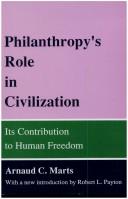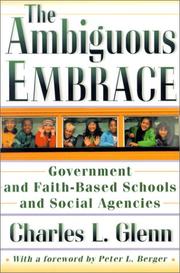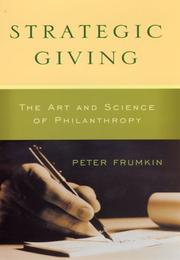| Listing 1 - 8 of 8 |
Sort by
|
Digital
Abstract | Keywords | Export | Availability | Bookmark
 Loading...
Loading...Choose an application
- Reference Manager
- EndNote
- RefWorks (Direct export to RefWorks)

ISBN: 0887384056 Year: 1991 Publisher: New Brunswick, N.J. Transaction Publishers
Abstract | Keywords | Export | Availability | Bookmark
 Loading...
Loading...Choose an application
- Reference Manager
- EndNote
- RefWorks (Direct export to RefWorks)
Charities - United States. --- Fund raising - United States. --- Marts, Arnaud C.
Book
ISBN: 1594037396 9781594037399 Year: 2013 Publisher: : Encounter Books,
Abstract | Keywords | Export | Availability | Bookmark
 Loading...
Loading...Choose an application
- Reference Manager
- EndNote
- RefWorks (Direct export to RefWorks)
In Philanthropy Under Fire, author Howard Husock defends the American tradition of independent philanthropy from significant political and intellectual challenges which threaten it today. Although the U.S. continues to be the most charitable nation in the world, serious efforts seek to discourage traditional, personal charitable giving by changing the tax code, and directing philanthropy toward causes chosen by government. Some voices seek to narrow the very definition of philanthropy to include only direct redistribution of income from rich to poor. In contrast, Mr. Husock broadly defends
Charities -- United States. --- Endowments -- United States. --- Philanthropinism -- Political aspects. --- Charities --- Endowments --- Philanthropinism --- Political aspects
Book
Year: 2011 Publisher: Chicago, IL : University of Chicago Press,
Abstract | Keywords | Export | Availability | Bookmark
 Loading...
Loading...Choose an application
- Reference Manager
- EndNote
- RefWorks (Direct export to RefWorks)
Since the dawn of the republic, faith in social equality, religious freedom, and the right to engage in civic activism have constituted our national creed. In this bracing history, Kathleen D. McCarthy traces the evolution of these ideals, exploring the impact of philanthropy and volunteerism on America from 1700 to 1865. What results is a vital reevaluation of public life during the pivotal decades leading up to the Civil War.The market revolution, participatory democracy, and voluntary associations have all been closely linked since the birth of the United States. American Cr
Charities -- United States -- History -- 18th century. --- Charities - United States - History - 18th century. --- Charities -- United States -- History -- 19th century. --- Civil society -- United States -- History -- 18th century. --- Civil society - United States - History - 18th century. --- Civil society -- United States -- History -- 19th century. --- Nonprofit organizations -- United States -- History -- 18th century. --- Nonprofit organizations - United States - History - 18th century. --- Nonprofit organizations -- United States -- History --19th century.
Book
ISBN: 2511002949 Year: 2013 Publisher: Cork : Primento Digital,
Abstract | Keywords | Export | Availability | Bookmark
 Loading...
Loading...Choose an application
- Reference Manager
- EndNote
- RefWorks (Direct export to RefWorks)
This ebook consists of a summary of the ideas, viewpoints and facts presented by Arthur C. Brooks in his book "Who Really Cares, The Surprising Truth About Compassionate Conservatism". This summary offers a concise overview of the entire book in less than 30 minutes reading time. However this work does not replace in any case Arthur C. Brooks' book.
Brooks points out that conservatives are the most companionate, and he argues that charity is important for the nation as a whole.

ISBN: 128296433X 9786612964336 140082351X 1400811783 9781400811786 9781400823512 069109280X 9780691092805 0691048525 9780691048529 1400802865 1400802857 9781400802869 9781282964334 Year: 2002 Publisher: Princeton, NJ : Princeton University Press,
Abstract | Keywords | Export | Availability | Bookmark
 Loading...
Loading...Choose an application
- Reference Manager
- EndNote
- RefWorks (Direct export to RefWorks)
This is a time of far-reaching change and debate in American education and social policy, spurred in part by a rediscovery that civil-society institutions are often better than government at meeting human needs. As Charles Glenn shows in this book, faith-based schools and social agencies have been particularly effective, especially in meeting the needs of the most vulnerable. However, many oppose providing public funds for religious institutions, either on the grounds that it would threaten the constitutional separation of church and state or from concern it might dilute or secularize the distinctive character of the institutions themselves. Glenn tackles these arguments head on. He builds a uniquely comprehensive and persuasive case for faith-based organizations playing a far more active role in American schools and social agencies. And, most importantly, he shows that they could do so both while receiving public funds and while striking a workable balance between accountability and autonomy. Glenn is ideally placed to make this argument. A leading expert on international education policies, he was for many years the director of urban education and civil rights for the Massachusetts Department of Education, and also serves as an Associate Minister of inner-city churches in Boston. Glenn draws on all his varied experience here as he reviews the policies and practices of governments in the United States and Europe as they have worked with faith-based schools and also with such social agencies as the Salvation Army and Teen Challenge. He seeks to answer key theoretical and practical questions: Why should government make greater use of faith-based providers? How could they do so without violating First Amendment limits? What working relationships protect the goals and standards both of government and of the organizations that the government funds? Glenn shows that, with appropriate forms of accountability and a strong commitment to a distinctive vision of service, faith-based organizations can collaborate safely with government, to their mutual benefit and that of those they serve. This is a major contribution to one of the most important topics in political and social debate today.
Church and state -- Europe. --- Church and state -- United States. --- Church charities -- Europe. --- Church charities -- United States. --- Church schools -- Europe. --- Church schools -- United States. --- Civil society -- Europe. --- Civil society -- United States. --- Human services -- Contracting out -- Europe. --- Human services -- Contracting out -- United States. --- Social Welfare & Social Work --- Social Sciences --- Social Welfare & Social Work - General --- School management --- Church and state --- Church charities --- Church schools --- Civil society --- Human services --- Contracting out

ISBN: 0873041402 9780873041409 Year: 1976 Publisher: New York (N.Y.): Family service association of America,
Abstract | Keywords | Export | Availability | Bookmark
 Loading...
Loading...Choose an application
- Reference Manager
- EndNote
- RefWorks (Direct export to RefWorks)
Charities --- Social service --- Associations, institutions, etc --- 364.62 --- -Social service --- -Associations, institutions, etc --- -#SBIB:316.8H30 --- Institutions, associations, etc. --- Networks (Associations, institutions, etc.) --- Organizations --- Voluntary associations --- Voluntary organizations --- Social groups --- Voluntarism --- Benevolent institutions --- Philanthropy --- Relief stations (for the poor) --- Social service agencies --- Social welfare --- Social work --- Human services --- Alms and almsgiving --- Charitable institutions --- Endowed charities --- Institutions, Charitable and philanthropic --- Poor relief --- Private nonprofit social work --- Relief (Aid) --- Associations, institutions, etc. --- Poor --- Endowments --- Maatschappelijk werker. Sociale werkers --(algemeen) --- Professies en methoden in het welzijnswerk: sociaal werk, vrijwilligerswerk, hulpverleningsmethoden … --- Societies, etc. --- Services for --- 364.62 Maatschappelijk werker. Sociale werkers --(algemeen) --- #SBIB:316.8H30 --- Charities - United States --- Social service - United States --- Associations, institutions, etc - United States

ISBN: 9780226266268 0226266265 9786611956837 128195683X 0226266281 9780226266282 9781281956835 Year: 2006 Publisher: Chicago : University of Chicago Press,
Abstract | Keywords | Export | Availability | Bookmark
 Loading...
Loading...Choose an application
- Reference Manager
- EndNote
- RefWorks (Direct export to RefWorks)
The philanthropic landscape is changing dramatically as a new generation of wealthy donors seeks to leave its mark on the public sphere. Peter Frumkin reveals in Strategic Giving why these donors could benefit from having a comprehensive plan to guide their giving. And with this thoughtful and timely book, he provides the much-needed framework to understand and develop this kind of philanthropic strategy. After listening for years to scores of individual and institutional funders discuss the challenges of giving wisely, Frumkin argues here that contemporary philanthropy requires a thorough rethinking of its underlying logic. Philanthropy should be seen, he contends, as both a powerful way to meet public needs and a meaningful way to express private beliefs and commitments. He demonstrates that finding a way to simultaneously fulfill both of these functions is crucial to the survival of philanthropy and its potential to support pluralism in society. And he goes on to identify the five essential elements donors must consider when developing a philanthropic strategy-the vehicle through which giving will flow, the way impact will be achieved, the level of engagement and profile sought, the time frame for giving, and the underlying purpose of the gift. Frumkin's point is that donors must understand strategic giving as the integration of these five critical dimensions to giving. Essential reading for donors, researchers, and anyone involved with the world of philanthropy, Strategic Giving provides a new basis for understanding philanthropic effectiveness and a promising new way for philanthropy to achieve the legitimacy that has at times eluded it.
Associations sans but lucratif --- Philanthropes --- Dons aux oeuvres --- #SBIB:316.7C124 --- #SBIB:309H504 --- 316.64 --- Cultuursociologie: gebruiken, zeden en gewoonten --- Code en boodschap: sociologische, antropologische benadering --- Maatschappelijke attitudes --(sociale psychologie) --- Charities. --- Charities - United States. --- Nonprofit organizations - United States. --- Nonprofit organizations. --- Philanthropists. --- Philanthropists - Charitable contributions - United States. --- Management --- Business & Economics --- Industrial Management --- 316.64 Maatschappelijke attitudes --(sociale psychologie) --- Nonprofit organizations --- Charities --- Philanthropists --- Charitable contributions --- Altruists --- Humanitarians --- Corporations, Nonprofit --- Non-profit organizations --- Non-profit sector --- Non-profits --- Nonprofit sector --- Nonprofits --- Not-for-profit organizations --- NPOs --- Organizations, Nonprofit --- Tax-exempt organizations --- Benefactors --- Associations, institutions, etc. --- art, artistic, artist, science, philanthropist, giving, donations, mentor, benefactor, wealth, wealthy, donor, donation, strategy, philanthropic, funding, funder, institutional, individual, logic, needs, commitment, belief, morals, ethics, impact, gift, united states, charity, charities, professional, career, america, time frame, scale, leverage.
| Listing 1 - 8 of 8 |
Sort by
|

 Search
Search Feedback
Feedback About UniCat
About UniCat  Help
Help News
News